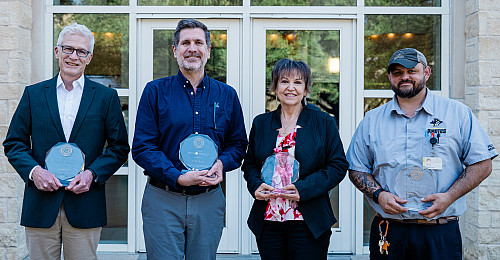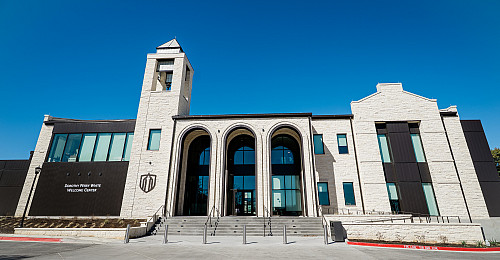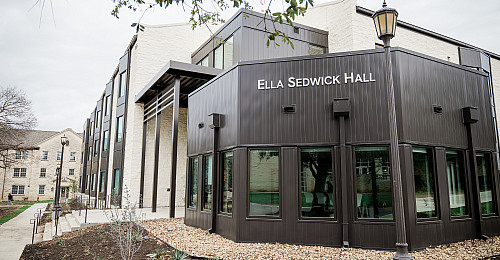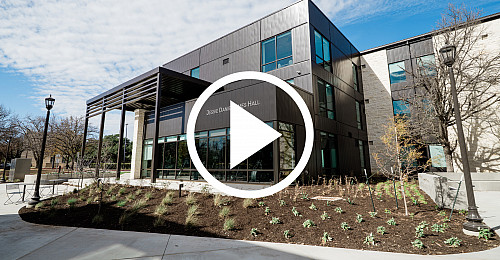Diversity at SU
Lorem ipsum dolor sit amet, consectetur adipiscing elit, sed do eiusmod tempor incididunt ut labore et dolore magna aliqua. Ut enim ad minim veniam nostrud.
Diversity at Southwestern / Initiatives
Initiatives
Institutional Commitments
- Adopted the Official Diversity Statement (approved by the University Council in 2010)
- Established the Office of Diversity Education (now named the Justice, Equity, Diversity, and Inclusion Center) to support the continued development of a positive campus climate.
- Created the DIBE Coalition to promote a diverse student, staff, and faculty body and an inclusive environment that is equally welcoming to all
- Developed a diversity and inclusivity strategic plan
- Included a DIBE theme in the tactical plan
- Joined Lacrella, Excelencia in Education, and others
Admission and Financial Aid
- Admission has partnered with EAB on a new initiative, College Greenlight, which helps support and recruit first-generation, lower-income, and historically underserved students. The College Greenlight seeks to develop a diverse pipeline of students who are more likely to apply, enroll, and succeed, and we will be part of a pilot program that will target seniors in New York, Chicago, Philadelphia, Minneapolis, Houston, and Dallas. In recognition of our growing number of Hispanic/Latinx families and our financial aid office now employs a bilingual counselor.
Academics
- Created a new minor in race and ethnicity studies
- Host an annual Race and Ethnicity Studies Symposium each January as part of the Martin Luther King Dream Week celebrations.
- SURF - SURF’s mission is “to foster a culture of research at Southwestern, made possible by student-faculty collaboration; to promote student investigative learning, persistence, self-efficacy, and success; and to create an inclusive and diverse research community.” It is stated on the SURF website and application that SURF is dedicated to equal opportunities and creating an inclusive learning environment in all programs at Southwestern. We strongly encourage applications from all.
Buildings and Memorials
- Changed the name of Ernest L. Kurth Hall to Ernest Clark Hall in honor of the first Black student to attend Southwestern
- Established the Cross-Cultural Center for all students to use for meetings and trainings and as a safe gathering place
- Designated gender-inclusive restrooms across campus
- Established the Justice Equity Diversity and Inclusion (JEDI) Center. The center creates diverse, equitable, and inclusive environments for all students through quality education, robust research, and community building.
Faculty Development
- Hosted book groups on such texts as Claude Steele’s Whistling Vivaldi: How Stereotypes Affect Us and What We Can Do and Jay Howard’s Discussion in the College Classroom
- Participate in the Higher Education Research Institute faculty survey, which includes a module that assesses the campus climate.
- Mellon Foundation Grant ($100K) to provide technology training for Dillard University faculty after Hurricane Katrina (2005-07)
- FOC CONNECT mentoring initiative funded by the ACS in 2022-23 supports cross-institutional mentoring. Led by Drs. Alicia Moore and Maha Zewail-Foote.
Faculty Recruitment and Retention
- Adopted an equal-opportunity hiring policy for faculty as well as staff with faculty rank
- A change to the Brief Annual Reports form that highlights DEI work in service: “Please reflect on your service activities (either within or outside of the University) that foster diversity, inclusion, belonging, and equity”
- Proposal to create a DIBE Coalition which includes faculty, staff and student committees was voted and approved by Faculty
Student Engagement
- Host the Willson Lecture series aimed to relate religious questions to social life and experience.
- Created the Persistence Committee to support first-year students, including first-generation students.
- Established the Captain’s Academy, which provides social and academic programs for first-generation students in their first year.
- Launched Daily Revision Advances Further Thinking (DRAFT), a program that uses writing and various forms of embodied and contemplative practices to generate support, solidarity, and community building for students who have historically been underrepresented in higher education.
- Founded Embracing Quantitative Understanding and the Inquiry Process (EQUIP), a program for admitted first-year students, typically underrepresented students, who are interested in majoring in a math or science field.
- Conducted campus climate surveys to assess students’ perceptions of race, gender, sexual orientation, religion, and class.
- Sponsor an annual diversity training retreat for students
- Offer a variety of diversity workshops, including a stereotypes workshop, diversity circles, difficult dialogues circles, a leadership diversity workshop, an identity workshop, a social economics workshop, and an intersectionality workshop
- $1 million in Federal Earmarks (Hispanic student program, $263K; TLCC equipment, $463K; and college preparatory program, $463K)
- Engaged Diversity Grants ($400K) from The Mellon Foundation for student and faculty exchanges (Dillard, Morehouse, Hutson-Tillotson, and Rhodes as partners) (2004 – 2010)
- Developed a “Greek Coalition” that is inclusive of all Greek letter organizations. The coalition was developed to create a collaborative and welcoming community for all fraternities and sororities.
- Counseling & Health staff have actively integrated diversity education into our clinical staff meetings and are working on developing and expanding cultural competency and exploring how to work across a broad spectrum of identity issues and concerns.
- Training related to unconscious bias is included in the training programs for the Sexual Misconduct Hearing Board and the University Committee on Discipline.
- Heritage Month event celebrations (i.e. Hispanic and Native American Heritage Months, Black and Women’s History Months)
- We dedicate at least one out of the ten Pirates in Progress meetings to engage in a DIBE activity. We typically invite someone from the JEDI Center to facilitate.
- Sprog Orientation Leaders receive DIBE training, so they are more prepared to support incoming students with a variety of identities and experiences.
- The Mosaic Mini-Grant provides funding to student projects and experiences that help them make meaning of their college experiences. This fund provides students with access to unique opportunities by reducing financial barriers.
- A menu of workshops and presentations are available for classroom support or student organization training. While the presentations cover a broad spectrum of topics, many support diversity and inclusion efforts, either explicitly (e.g., microaggressions, community agreements, navigating challenging conversations, dimensions of spirituality) or adjacently (e.g., team building, embodied self-care, mindfulness, stress management, protest safety).
- The Division of Student Life has hosted professional development in-service days for all division staff (summer ’21 and ’22). Diversity and inclusion training were provided.
- Diversity training for RAs is conducted annually.
















